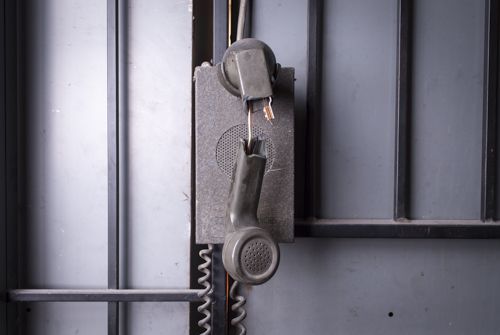Dermott Hayes's Blog: Postcard from a Pigeon, page 60
July 26, 2016
Kindle giveaway for writers
Someone might be interested in this, so I share…
Hi Authors,
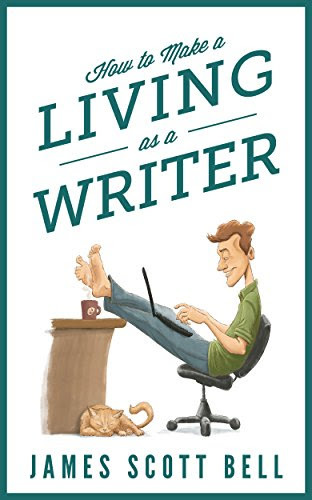 As you know, we run all kinds of reader giveaways from $25 Amazon gift cards to HUGE $500 Holiday shopping sprees. But now we want to have a little fun with our first ever “author giveaway”.
As you know, we run all kinds of reader giveaways from $25 Amazon gift cards to HUGE $500 Holiday shopping sprees. But now we want to have a little fun with our first ever “author giveaway”.
This is a first for us, but we’re excited to giveaway a print copy of “How to Make a Living as a Writer” by James Scott Bell, and since many of you are already writing full-time, we’re also giving away a print copy of “Captivate Your Readers: An Editor’s Guide to Writing Compelling Fiction” by award winning editor, Jodie Renner.
As writers, we need to constantly train ourselves through reading and study if we want to improve and write the next bestseller, so we hope you join us in this easy giveaway to help promote our services to other authors you may know.
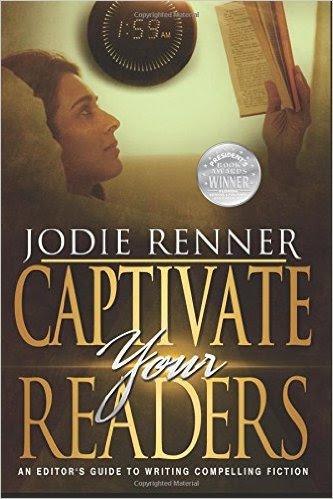 Here’s HOW You can Win one of these books….
Here’s HOW You can Win one of these books….
1.) Share our subscribe link with your fellow author friends. https://form.jotform.com/22311094434949
2.) If a NEW author subscribes, and adds you as the referral, and we draw the new authors name (from our list of NEW subscribers as of today), YOU BOTH WIN. It’s that easy. We’ll let each of you decide what book you want… take your pick!
Here’s an example of how you can share on Facebook or Twitter, or wherever….
EX:
WIN in a copy of How to Make a Living as a Writer by James Scott Bell. Just subscribe to @Kindlbookreview and add me as a referral. We could both WIN! Click here to subscribe ~> https://form.jotform.com/22311094434949
OR:
WIN a copy of Captivate Your readers by Award Winning editor, Jodie Renner. Just subscribe @Kindlbookreview and add me as your referral. Sub here ~> https://form.jotform.com/22311094434949
We’ll post the winners on August 7th.
If you have questions or comments please contact Jeff at jeffbennington@ymail.com.
Good luck everyone and THANK YOU so much for sharing and helping us to help more authors promote their Kindle books!


Elusive
https://dailypost.wordpress.com/prompts/elusive/

“It’s there, I tell you, I put it there yesterday. In a mason jar, sealed good and tight.”
Sean was pointing at the lowest shelf of the garden shed, the old shed at the bottom of the garden, beside the blackthorn bush, the garden shed everyone was afraid to go near. But he knew, even as he pointed, there was nothing there.
He could see his father’s smile, his eyes crinkle, then turn away because he didn’t want Sean to see him but Sean knew.
His lower lip pouts, despite his best efforts. ‘I won’t cry,’ he thinks. He puts his hands in the pockets of his khaki shorts and kicks a dandelion, watches the fluffy bits take flight.
His father makes a show of rearranging the pots on the shelf where he had pointed. He picks a few things up, looks inside them; a glass jar filled with paint brushes, a half empty sack of plant food. He doesn’t want to belittle his son’s discovery.
“No, it’s not here,” he says, “are you sure you sealed the jar?”
“I did, I swear,” Sean says and nudging beside his crouching father’s form, he points, “I put it right there.”
‘What size of jar was it?”, his father asks.
“It was one of those gallon jars,” Sean says earnestly, “from your workshop.” He catches his father’s sidelong glance. The workshop and those jars, in particular, were out of bounds.
“I had to use something, there was no option,” Sean explains, “he was caught in the knothole of the shed wall. He would’ve got away.”
“What size was he? Was that jar big enough for him? Did he have air to breathe in it?,” his father asks.
“He was the size of my hand, but thin, fierce thin,” Sean explains, squinting, as he conjures the image of the elusive fairy king in his mind’s eye, “there was plenty of room for him and I pierced the top of the jar a few times. I even threw in a few blueberries, in case he was hungry.”
His father shares a grave and somber look with his seven year old son, his youngest, a bright boy, bristling with intelligence, pent up youthful energy and mischievous adventure. The jars, he used to store his homemade hooch and the old shed, he used to store that year’s product.
“He was going in there to steal your Fairy Mead, Da,” Sean says. His father smiles and, limbs creaking, he stands tall, his right hand tousling his son’s blond curls, his eyes sweep the top two shelves, counting.
“And you stopped him, son, well done and I bet you gave him the fright of his life. He won’t be back, in a hurry,” his father tells him, “but you mustn’t tell anyone about catching him.”
“Why’s that, Da?” Sean asks.
“Those fellas hate to hear anyone tell about catching them. It makes them angry and they’d surely come back and bring a crowd with them, too. No, we’ll keep this between ourselves but I’m promoting you.”
Sean stares at his father, wide eyed, agog.
His father fishes in his pocket and produces a badge, a shiny badge with a harp and a circle of gold. He kneels and pins it to his son’s shirt. Sean’s lip’s no longer pouting, it’s pursing. He can feel his cheeks glow.
His father winks one eye, silently, then he whispers, “you’re the fairy marshal of this garden.”


July 25, 2016
Sanctuary
https://dailypost.wordpress.com/prompts/sanctuary/
50 word story
Deafening noise, flashing lights and rapid, frantic movement, why, he thinks, do people scurry in these situations? Scurry, it sounds like the explosive result of a Friday night takeaway. At least the streets are clearing. Fumbles for keys, fuck, dropped them. Whoa, steady, there they are. Opens door. Sanctuary.


End of an Era
Having worked in the newspaper industry in the latter half of the 20th century, I saw these changes and the writing, on the wall…
Photographer Sean Dana is the Edge of Humanity Magazine contributor of this documentary photography. From his project ‘Howard Quinn Closing‘. To see Sean’s gallery of projects click on any image. Howard Quinn has been printing in the same location since 1961. When I began shooting photographs and video at Howard Quinn in […]
via Closed For Business! The Howard Quinn Company’s Story — Edge of Humanity Magazine


The Clock, a Mickey Mouse response to a daily prompt
https://dailypost.wordpress.com/prompts/clock/
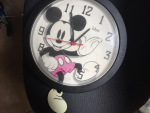
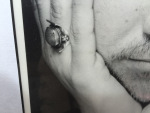
He can’t look at his clock. It has a prominent position in his apartment, just below a skylight. It’s in clear view when he enters the room and when he sits on his couch, it’s right in front of him. He never looks at it.
That’s not quite true. As a battery operated clock, he does change the batteries, occasionally and then, twice a year, he puts the clock forward and back, one hour, for the summer and winter time adjustments.
His relationship with the clock wasn’t always so strained. It was a Mickey Mouse clock, official Disney Quartz ware, with Mickey, in his customary red shorts and white gloves, smiling, four fingered left hand aloft, in a sort of ‘voila’ or showman-like ‘hey’ gesture, left foot swinging, as if dancing. The right leg dangled, below the face of the clock and that was the feature he always loved.
It was thrown in as a bonus payment for a p.r. job he did for a small gallery. The curator told him she was putting on a Disney exhibition but she was overwhelmed by the 100 plus pages of public relations’ guidelines given to her by the Disney organization. She asked him to write a press release and he obliged by compressing the Disney guidelines into five pages with a one page press release for her exhibition.
She sent those to the Disney HQ for approval and was surprised when they called her and said, not just ‘yes’ but asked, ‘who wrote the ten page guide book and can they use it?
She was so delighted she wanted to pay him extra but didn’t have any money so she told him he could have anything in her shop for less than £100 and he picked a ring he always loved. It was a Nepalese saddle ring with a beautiful, roughly polished red coral stone inlay. She was so happy with his choice – mostly because the rings were worth about a quarter of their retail value and she had them on sale or return – she gave him the Disney clock, too.
He was delighted. He loved the ring and wore it proudly, feeling it had picked him. He liked the clock, too, because he didn’t have one and a Mickey Mouse clock, he thought, was a cool clock to have if you never had a clock, before.
Two years later, when he was attending an exhibition of Dream paintings by a Nepalese artist in a well known city gallery, the artist picked him out from across the room and made a beeline for him and grasped his hand and said, ‘where did you get this ring?’ So he told her the story while the artist listened and rubbed the stone. He always felt he was right to think it was special, after that.
A couple of years later, a girlfriend of his, who loved to wear the ring, threw it out the window of their third floor apartment into the grounds of a Medieval church. He never found it and even today, twenty years later, when and if he does look at the Mickey Mouse clock, he wonders where the ring is and who’s wearing it?



Don’t Fence Me In…
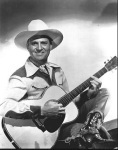

Oh, give me land, lots of land under starry skies above
Don’t fence me in
Let me ride through the wide open country that I love
Don’t fence me in
When I heard Gene Autry, America’s favourite cowboy, was a 33rd degree Mason, I was disappointed. On reflection, I don’t know why I was either surprised or disappointed. They say you should never meet your heroes and, while Autry was never a hero of mine, I admired him for no apparent reason other than I’d heard him sing, ride a horse and save the girl, all in the same movie. Meeting your hero, I suppose, means knowing too much about them because they’ll always let you down. Why? Well, because they’re shorter than you thought or they’re mean to young boys and old women.
Nothing’s ever what it seems and sometimes things take on new meanings, too. Like that song, Don’t Fence Me In that Cole Porter bought from highway engineer and poet, Robert Fletcher for $250 in 1932. The song was commissioned as a cowboy song for a movie called Adios, Argentina, that was never made.
It got its first public airing in another movie, Hollywood Canteen, in 1944, when it was sung by Roy Rogers. Back then, it was just a simple cowboy song. But for others, it meant much more than that. Robert Fletcher, who wrote the lyrics of ‘Don’t Fence Me In’, later went on to chronicle much of Montana’s history for the State tourism agency and in the ’50s, he was invited to write a history of the cattle industry in Montana by the Montana Cattlemen’s Association. It was called Free Grass to Fences.
That’s a title that was as meaningful as ‘Don’t Fence Me In‘, when you consider Montana’s cattle barons were as involved in the Johnson County war of 1884, unleashing an army of hired vigilantes on homesteaders to exert their control of grazing rights and the open range.
The song was recorded by many artists, including Bing Crosby and The Andrews Sisters, ex Talking Head, David Byrne and even Apu, from The Simpsons. But perhaps its most ironic use was by an East Berlin radio station, Ops, who broadcast it nightly as their theme tune, directed at American GIs stationed in West Berlin, shortly after the erection of the Berlin Wall.
It’s not the first time, either, that a popular song has been misinterpreted or misappropriated, or both.
Two classic examples of such songs spring to mind, Woody Guthrie’s This Land is Your Land and Bruce Springsteen’s Born in the USA.

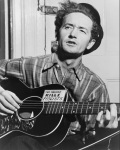
Guthrie was a folk singer and labour activist in Depression era America and wrote the song in 1940 because he was tired of hearing Kate Smith sing Irving Berlin’s ‘God Bless America’ every night, on the radio. The song has since become one of America’s favourite and best known folk songs.
It was first recorded in 1944 by Moses Asch of Folkways records and became a hit for The Weavers. Their version excluded two of Guthrie’s original verses that, if recorded then, might’ve carved a completely different history for the song and its author.
Guthrie, a vocal opponent of corporate America, titled the song, God blessed America For Me and one of those verses addressed the restriction of freedom imposed by private property.
Was a high wall there that tried to stop me
A sign was painted said: Private Property,
But on the back side it didn’t say nothing —
[This land was made for you and me.]
In another verse, Guthrie comments bitterly on the Depression era destitution of working class people,
One bright sunny morning in the shadow of the steeple
By the Relief Office I saw my people —
As they stood hungry, I stood there wondering if
[This land was made for you and me.]
Then there’s Bruce Springsteen’s Born in the USA, itself a damning indictment of the treatment meted out to post Vietnam war veterans, who felt ostracized, abandoned and betrayed, returning home, from a war they never wanted, to unemployment and being ostracized in their own country by the same Government that sent them to fight in the first place.
“Born in the U.S.A.”Springsteen said, ” is about “a working-class man” [in the midst of a] “spiritual crisis, in which man is left lost…It’s like he has nothing left to tie him into society anymore. He’s isolated from the government. Isolated from his family…to the point where nothing makes sense.”
Analysts of the time thought Springsteen’s song echoed blue collar sentiments of the day but others contrasted the song’s upbeat chorus to the downbeat and damning lyrics.
Born down in a dead mans town
The first kick I took was when I hit the ground
End up like a dog that’s been beat too much
Till you spend half your life just covering up
The album, Born in the USA, was released in 1984 and became an instant hit. That same year, Ronald Reagan’s campaign staff made overtures to Springsteen to use the song in the President’s re-election campaign. Needless to say, Springsteen declined.



July 22, 2016
**New Project** Who Shot Tony Blair?
Having waded through Finnegan’s Wake, PorterGirl ventures into science fiction and hopefully, some wickedly sadistic, political satire
In a post-Brexit, pre-dystopian Britain, the traditional political system has collapsed and Tony Blair is back in Number 10. Only this time, he is tied to a chair in the kitchen under the watchful eye of the accidental Prime Minister’s mother.
Following several years of instability, Britain is more divided than ever. The country has devolved into a ragtag assembly of self-governing provinces, each with their own unique and particular arrangements. Elected to the position of Prime Minister of East Anglia by lottery (considered the only true method of democracy by some drunk Cambridge scholars), Lucy Wastell comes to power with the intention of reuniting her beloved country, establishing Cambridge as the new capital city and giving her chums all the top jobs. Which – considering she was a receptionist until last week – shows remarkable political nous.
When ex-Prime Minister and all-round war monger Tony Blair is captured by…
View original post 481 more words


Not a Pheasant Plucker,Chapter 2, A Touch of Pain
Following last month’s posting of the first chapter of Not a Pheasant Plucker,https://dermotthayes.com/2016/06/03/not-a-pheasant-plucker/ here’s the second chapter,
A touch of pain…ALL COMMENTS WELCOME AND ACTIVELY ENCOURAGED
‘It’s not good news, Mrs M. You should’ve come to see me earlier, but we’ve been through all that. The results of your blood tests and biopsy are here. It’s just as I expected, the tumour is inoperable and secondary tumours have developed. I’m surprised you’re even walking around.’
Seanie’s mother listened to the doctor’s words. He was confirming what they both knew a month before when she’d first come to see him. She heard words and phrases like ‘metastatic’ and ‘phase four’ and ‘unresectable’, but it was all Latin to her.
The doctor was a good man, she knew, she’d known him all her life. They were almost the same age and he’d seen her through three pregnancies and two miscarriages, whooping coughs, measles, chicken pox, the death of her husband and God knows what else in between. He wasn’t giving out to her. He was only filling the gap caused by his own despair and helplessness, by talking. She couldn’t hear the words, just the sound and tone of his voice and the way his eyes tried to avoid hers while he looked straight at her. It was as though she’d gone already, ceased to exist, a dent in his cushion.
She’d felt the first pains in June, like a pain in the stomach, or thereabouts and she thought it was something she ate. It wasn’t like her. She could eat anything and though she wasn’t fussy, she was particular about her meat, it had to be fresh. The diarrhea came shortly after the stomach pains. She got something from the chemist. He was a young fella, a rash on his collar and spots on his chin, still wet behind the ears. He said it would stop the diarrhea. It was a fruity powder in a sachet, a diorylite, he said, to prevent the dehydration. He gave her Motilium, too, he said it was to make her stool firm. She couldn’t get out of the place fast enough. She wished she could’ve bought a bottle of Milk of Magnesia. It never did us any harm, she thought, and that and cod liver oil kept you regular and healthy.
She never went back after that, even when the diarrhea became a regular thing and she stopped eating, lost her appetite. She was losing weight, too even if she’d always been as thin as a whippet. ’There’s more meat on Good Friday,’ her mother used to say about her. But even though she was thin, she was always strong. ‘You can’t put fat on a thoroughbred,’ her Da would say in her defence. But now, she knew it was different. Aside from the bursts of pain that could double her over and leave her breathless, the strength had left her. She used to think nothing of lifting two boxes of oranges. Now she couldn’t lift a match to strike it.
‘Will I see out the Christmas?’ she asked him.
The doctor put down his notes. He took his glasses off that had been perched on the end of his nose. He held them in his right hand, between his forefinger and thumb and drummed them off the edge of the desk. He stared straight at her, meeting her gaze. For the first time today, she thought.
‘There’s no need for that talk,’ he said, unconvincingly, then hesitated, thinking. ‘It’s time to put your affairs in order, Mrs M and you might think about the Hospice. There’ll be no problem getting you a bed there where you’ll be comfortable and there’ll be people around you who’ll understand and can care for you…’ His voice trailed off. There was a silence between them. He looked at her, almost pleading, as though he expected her to agree with him, to make it better. But she’d had enough of that. Mary Maher wasn’t going out without a fight, she thought.
‘Ye didn’t answer my question,’ she said. He looked at her, confused.
‘Will I see out the Christmas?’ she asked, again.
‘I don’t know,’ he answered, a defeated, helpless look in his eyes, ‘I really don’t know. I can’t answer that. You could live a week or another six months. I don’t…is there any family you’d like me to contact? Will you have someone to look after you? Do you want me to make enquiries about the Hospice?’
She felt dizzy trying to listen to him. She could hear his voice and she knew he meant well but he was talking again to fill his own void and quell the fear he felt, she thought, because he was talking to a dead person and they were sitting in the room talking to him.
‘That’s alright, doctor, I’ll be fine,’ she paused, then giggled when she thought of what she’d said, ‘I won’t be fine, of course, I’ll be dead.’ She giggled again. He smiled and she laughed and then they were both laughing and then the tears were running out of her eyes and she was sobbing and he looked at her, helpless again, gripping the edge of his desk with both hands, clamped tight. And then she felt the pain as though someone had caught her innards in a vice clamp and she was gasping for air, choking. The doctor stood and walked around his desk to the sink. He grabbed a paper cup from the conical dispenser and poured the water and then he stood over her, rubbing the small of her back as she was bent double in her chair, before him. ‘Take this,’ he said and pressed the paper cup into her hand. Then he went to his dispensary cabinet and fussed about with a key and a cabinet at the back with a metal door, within the glass fronted cabinet. He took out a hypodermic needle and a small bottle, unscrewed the top of the bottle, inserted the needle in the soft, inner cap and extracted some of the medicine within. He looked at ease, even though his eyes darted back to her from what he was doing. She could breathe now, the pain had passed. She sipped the cold water. She was used to them, the pains, by now, although that one was heavier than the usual. The doctor didn’t look as nervous or put out now. He’s doing what he knows best, she thought, and that’s what I’m going to do. No hospice, I wouldn’t have it. I’ll die in my own bed.
‘This is something to relieve the pain,’ the doctor said, as he approached her with the needle.
‘What is it,’ she asked.
‘It’s a mild morphine solution,’ he said.
She nearly jumped in her seat but she didn’t; she was immobile because, though the pain had receded, she was still in its grip. She watched the doctor unbutton the sleeve of her blouse and attach the rubber band he used, to her upper arm and then he tapped her arm, just below the elbow, searching for the vein and then, while holding her arm, gently, with one hand, he eased the air out of the needle and quickly sent it home, before she could muster an objection. But if the truth were told, she was glad; glad of some relief, glad of the knowledge, of the loss of uncertainty, glad that she now had a project, to die in peace, to see Seanie right, poor soul and make her peace with her friends and neighbours. Sure, I could’ve died in the street or be struck down by a bus. At least this way, she thought, she could see it coming.’
And that was it, as she felt a weight lift from her shoulders. She looked at the doctor who was looking at her, concerned. But she didn’t feel the pain, anymore, the pain of not knowing, she thought.
‘I won’t need the hospice,’ she said, ‘at least, not yet. There are things to do, Christmas is only around the corner and I’ve nothing got and if it’s me last, I’ll make it one to remember.’
She smiled again, appreciating her own private joke.
‘The family’s all grown up and gone but I’ve one son, the youngest. He’s still at home to look after me,’ she told the doctor, knowing the reverse was the truth and she had Seanie to worry about, on his own, after the life he’d had. And the doctor looked at her and didn’t believe a word she was telling him but he marvelled at her strength and resolve.
‘I’m going to give you a prescription,’ he said, ‘for painkillers, but I’m sending the district nurse around to you tomorrow and I’ll give her all you’ll need and show you how to set yourself up and keep you, well, comfortable.’
His eyes were avoiding hers, again and she felt sorry for him because, although right then she felt no pain, he knew it would come and he could do nothing for her. How many people has he looked after until he couldn’t any more and all he could say was ‘you’re dying, she thought.’
And with that, she began to gather her wits and her belongings about her. She rolled down her sleeve and fastened the button. The doctor walked over to the door and took her coat down off the hook. He held it for her, by the collar and waited until she rose. That wasn’t as easy as she might’ve thought, she discovered. The pain had slid away but so did the floor, she thought, as she pushed herself up to stand. ‘Jaysus,’ she said, as she gripped the arm of the chair and the doctor’s desk. The doctor rushed to her side and gripped her elbow, her coat now hanging from the crook of his other arm. ‘Do you want me to call you a taxi or someone to collect you?’
‘No, no, sure I’m only down the road. I’ll be right as rain in a minute. It’s just a dizzy spell. I stood up too fast and I’m probably high as a kite, too.’ The thought made her giggle again as an image of herself, standing on the street corner, sniffling and scratching herself, waiting for her dealer, with all the other brass monkeys, flashed in her mind’s eye. The doctor was looking at her again, concerned, as he held her coat up . She didn’t bother explaining it to him. ‘I’ll be grand,’ she concluded as she slipped her arms into the sleeves of her coat, the warm, black, wool one she always wore when she went out, for Mass or an appointment. She wrapped her scarf, snug around her neck and tucked the ends into her coat, crossing them over her chest, before she buttoned up. She patted her chest, to assure herself that all was secure. It was something she always did. The doctor handed her her handbag and the small, carrier bag she always carried with her to remind her to collect the messages, some bread and milk and a pork chop for Seanie’s dinner. She stole a quick look at herself in the glass door of the cabinet behind the doctor’s desk and made a slight adjustment to the scarf she wore and had never taken off throughout the entire visit.
‘Right, that’s me, now,’ she said and turned to the door. The doctor stepped ahead and opened it for her. ‘You take it easy, now, Mrs Maher. Go home and put your feet up, get some rest. The nurse’ll be around to you in the morning and I’ll drop around, myself, in the afternoon, when the clinic’s finished, to make sure you’re comfortable.’
’Thanks, Doctor, you’re a good man,’ she said, as he reached out and grasped his left hand and squeezed it. She walked out the door, past his receptionist and into the hallway without looking back.
That’s that, now, she thought. Her next thought was about how she’d tell Seanie.


July 21, 2016
Hope springs Eternal
https://silverthreading.com/2016/07/20/wqwwc-writers-quote-wednesday-writing-challenge-hope/

Hope is the push
that opens the door
Hope is the step
into the unknown
Hope is the pull
from grief to relief
Hope is a trickle of water
from a drought dry spring
Hope is a candle
in a windowsill
Hope is the word
that lifts doubt from despair
Hope is the seedling
fighting to bloom
Hope is a baby
the essence of maybe
Hope is the dream
of what we can be
Hope is a mirage,
a shimmering image
a flame without fire,
a burning desire
Hope is a bill
you don’t have to pay
Hope is a thief
in a bright, shiny suit
selling big money schemes
while stealing your dreams
Hope has no limit
No last stop, no terminal
Hope springs eternal


July 20, 2016
Turmeric paste
Healthy, sunshine lunch of mackerel with homemade turmeric paste
https://dailypost.wordpress.com/prompts/feast/

So I had a bag of fresh turmeric but I knew I wasn’t going to cook enough dishes to use it all, on time. Then I didn’t see any point in drying it out if I can go to my local Middle eastern food store and buy it by the bagful.
Then I figured, why not make a paste, using fresh, aromatic ingredients and all the turmeric.
It contains about 200g of fresh turmeric, four chillis, a big clove of garlic, a chunk of fresh ginger, a handful of fresh coriander, juice of one lemon and half a cup of lemon vinegar.
Then I was barbecuing, so I gutted and filleted a mackerel I’d just bought at my local fishmongers. After seasoning the skin side with salt and black pepper, I brushed the meat side with the turmeric paste, let the skin side cook until the skin popped, then I…
View original post 34 more words


Postcard from a Pigeon
- Dermott Hayes's profile
- 4 followers


